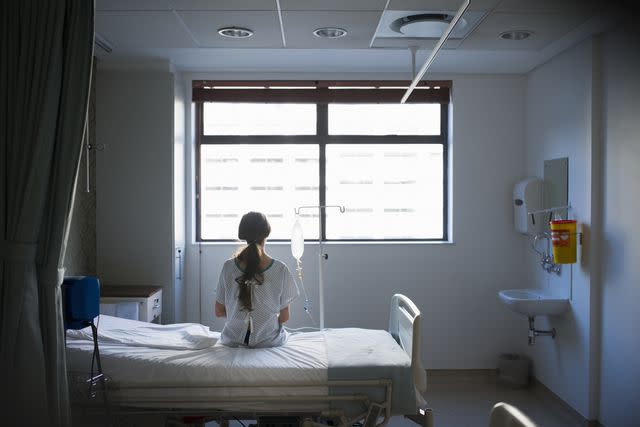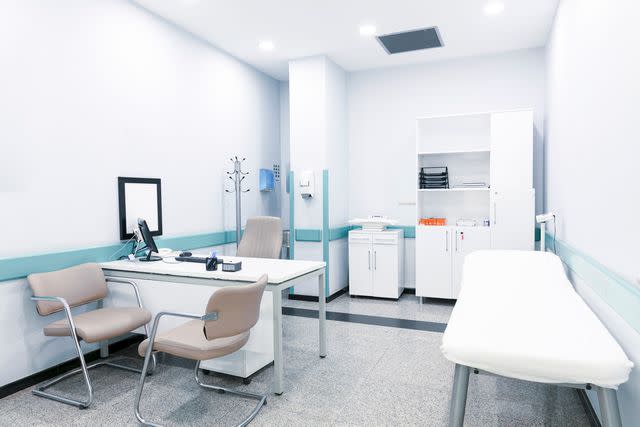Mom Is in ‘Complete Shock’ After a Pain in Her Side Led to Her Cancer Diagnosis
The mother of three was informed that she also needed a living liver transplant, which she received from her co-worker

Getty
Modern clean hospital ward stock imageJamie Ball was experiencing pain in her side that she chalked up to gallbladder issues in November 2021, which ultimately led to the discovery of liver and colon cancer.
After almost a month of pain, the now 37-year-old woman said she “couldn’t tolerate it anymore” and headed to the emergency for pain medication, reports TODAY.com.
Rather than receiving a pain prescription, the mother of three received the news that she had stage 4 colon cancer and a 15% chance of survival, per TODAY.com.
“I was in complete shock because that thought didn’t even cross my mind,” she told TODAY.com. “I am young.”
Related: Woman Denied Mammogram at Age 30 Reveals Second Breast Cancer Diagnosis: 'Trying to Stay Positive'

Portra Images
Stock image of patient sitting on hospital bed waiting.Once she was informed of her diagnosis, she learned that the cancer had metastasized to her liver. The doctors disclosed that her prognosis was low and explained to Ball she could be a candidate for a liver transplant.
“I was under the impression that I could have a liver resection," she told TODAY.com. A liver resection is surgery to remove the parts of the patient’s liver, according to the Cleveland Clinic. However, people must have “up to two-thirds of your liver removed as long as the rest of your liver is healthy.”
Unfortunately for Ball, doctors discovered the was cancer on both sides of her liver, meaning she was no longer eligible for a resection. "So my only chance was really a living donor,” said Ball.
After her initial diagnosis, she began chemotherapy the next month and underwent a total of 12 rounds.
Although she “responded very well,” Ball shared it was “really hard,” noting that she couldn’t eat, “lost about 75, 80 pounds,” and developed neuropathy. (Neuropathy is painful nerve damage that can be caused by chemotherapy, according to the American Cancer Society).
Related: Mom, 40, Had a Widowmaker Heart Attack — This Unusual Symptom Led to Her Diagnosis
Soon after, in early 2022, she then received a colon resection, which removed the remaining cancer in her colon. But she still was waiting for a liver transplant.
“If I got placed on the recipient list, I’d be towards the bottom because my liver was still highly functioning,” she explained. Due to her circumstances, doctors advised her to search for a living donor, a type of transplant that occurs when a person with a matching organ donates part of their liver to the in-need patient, per the Mayo Clinic.
Ball shared an update on social media to search for a match, and many volunteered, including her sister and co-worker. Ball’s sister was “rejected as a donor,” but her co-worker Jennifer was an approved match.

Getty
Stock image of empty doctor's officeRelated: Mom Assumed Her Night Sweats Were a Symptom of Menopause — But She Had Cancer
Ball and her co-worker proceeded with the surgery in February 2023. “I had racing thoughts the whole night,” she explained to TODAY.com. “I wasn’t completely sure that the transplant would happen.”
Although receiving a new liver was Ball’s “only chance at life,” the surgery went well, and Ball is now cancer-free.
Never miss a story — sign up for PEOPLE's free daily newsletter to stay up-to-date on the best of what PEOPLE has to offer, from celebrity news to compelling human interest stories.
Dr. Lorenzo Machado, a transplant surgeon at Allegheny Health Network in Pittsburgh, performed Ball’s transplant and told TODAY.com that a patient “being treated with chemotherapy” with cancer in both their liver and colon has “at best 10 to 20% (five-year survival).”
He shared that the odds of a five-year survival rate increase to “around 80%” if the patient received a transplant.
“The liver has the potential to regenerate,” Dr. Machado explained. “If we remove the right side, it doesn’t form a whole new right side. But the left side … will grow, will hypertrophy to meet the needs of the patient.”
Dr. Machado explained that the transplant “can potentially improve their survival threefold,” but patients must take anti-rejection medications for the remainder of their life.
Following her surgery, Ball spent one month in the hospital but didn’t feel normal for an additional five months. Now, she’s been cancer-free for a year and is celebrating how "amazing" organ donation is.
For more People news, make sure to sign up for our newsletter!
Read the original article on People.

